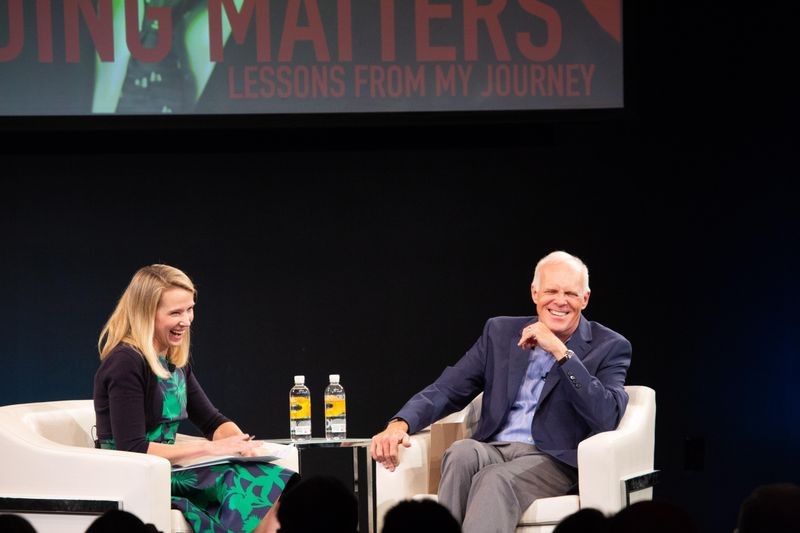

Alphabet Chairman and former President of Stanford University John Hennessy in conversation with Marissa Mayer, cofounder of Lumi Labs and former president and CEO of Yahoo.
Storytelling can “engage the heart” and inspire people to follow your vision, according to John Hennessy, Alphabet chairman and former president of Stanford University. He and moderator Marissa Mayer, cofounder of Lumi Labs and former president and CEO of Yahoo, recently discussed some of the leadership stories and advice that Hennessy shares in his new book Leading Matters: Lessons From My Journey. The event was produced by the Exponential Center at the Computer History Museum on September 20, 2018.
In the spirit of storytelling, the intersecting “backstories” of Hennessy and Mayer involve key elements of Silicon Valley that have supported far-reaching technological innovations for decades: a world-class research university, a massive global technology company, tech research and entrepreneurship, and personal networks. As a computer science professor, Hennessy led a research project that developed the reduced instruction set computer (RISC) architecture now used in 99 percent of new computer chips; with David Patterson, he received a Turing Award in 2017 for that work. To commercialize the product, Hennessy became, as he says, “a reluctant entrepreneur” and cofounded MIPS Computer Systems. Marissa Mayer, who recently became an entrepreneur herself by cofounding Lumi Labs, which researches AI, earned her BS in computer science when Hennessy was chair of that department. After continuing on to earn an MS, she become employee #20 at Google, founded by two other Hennessy students. In the meantime, Hennessy had gone on to become dean of the engineering school and then president of Stanford. Mayer recalled that when Google went public, the most rewarding part of the IPO was the announcement that John Hennessy had agreed to be on the board.
To lead either a world-class university or a successful global company is remarkable, but to do both is unique. As unprecedented technological innovations transform humanity, John Hennessy embodies the leader we all want in the driver’s seat: humble, curious, thoughtful, empathetic, authentic. In his book, Hennessy credits these qualities, among others, as key to his success. But he also insists on the value of experiential learning throughout any person’s career. He cautions students who want to be entrepreneurs to make sure they have a new discovery or technology before looking to start a business. He warns new entrepreneurs not to focus on making money at the expense of building a strong company that has long-term value for customers and employees as well as shareholders. And, he urges leaders to resist the bubble that often results from power and authority. A committed educator, he encourages everyone to try big things, learn from experience, and “don’t be afraid to fail.”
This advice holds true for both individuals and institutions. Hennessy describes mistakes he made in the startup company he cofounded as well as an abandoned effort to build a Stanford campus in New York City.
John Hennessy describes mistakes as an entrepreneur and university president.
Certainly, learning from failure is useful, and Hennessy says his own setbacks informed later leadership decisions, but is it possible to avoid failure in the first place? Can you teach entrepreneurship? Stanford is certainly trying and has become a leader in this area with a variety of programs, including the Center for Entrepreneurial Studies and the Stanford Technology Ventures Program, which teach some critical basic skills—like how to put together a business plan. Hennessy notes that the terminology and vocabulary of business is “not rocket science,” but the experiential component cannot be taught.
John Hennessy advocates learning from experience in business.
Hennessy’s word of advice to aspiring entrepreneurs: Innovate! He believes a commitment to innovation must be built into a company from the start and relates Google’s decision to acquire YouTube. At the time, this prompted jokes about why they would want a company consisting of homemade cat videos, but given where content on the web was headed it proved to be a prescient choice.
John Hennessy discusses innovative ideas at Google.
Long experience as a leader in Silicon Valley gives Hennessy an opportunity to reflect on changes he has observed over time. He notes that whereas companies used to develop and sell tech products to other companies and technologists, today’s new technologies touch everyone’s lives, requiring CEOs with a new kind of vision. He remarks on the improving gender disparities in computer science and applauds women leaders like Marissa Mayer, noting that a certain breed of men uncomfortable with strong women is dying out. Perhaps one of his most intriguing stories illustrates how sometimes the strongest leadership for an organization is embodied in a partnership or a group, rather than an individual.
John Hennessy comments on the strengths of partners in leadership.
Of all the key leadership traits included in his book, Hennessy says that the concept of leadership as service is the hardest to achieve. He believes that there is a lack of leadership in every sector of society and that good role models are lacking. To address the problem, he and philanthropist Phil Knight founded the Knight-Hennessy Scholars, a program at Stanford designed to train great leaders to tackle global challenges. Welcoming the inaugural class this fall, Hennessy is optimistic about putting the future into the hands of a new generation of leaders—and one that just might include the first woman president of the US.
”Leading Matters: Lessons from My Journey: An Evening with Alphabet Chairman John Hennessy in Conversation with Marissa Mayer,” September 20, 2018. This event is produced by the Exponential Center at the Computer History Museum.
The Exponential Center at the Computer History Museum captures the legacy—and advances the future—of entrepreneurship and innovation in Silicon Valley and around the world. The center explores the people, companies, and communities that are transforming the human experience through technology innovation, economic value creation, and social impact.